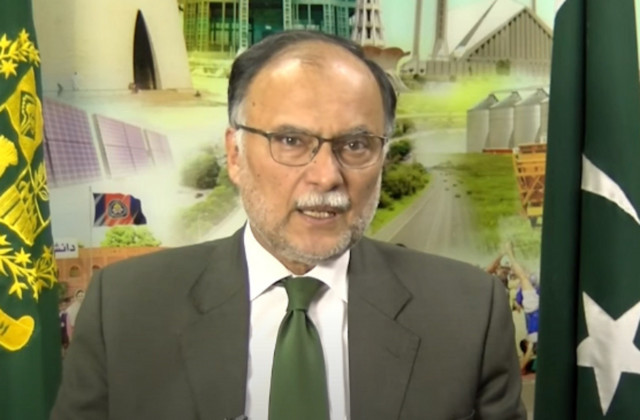Solving Karachi's water shortage not federal government's responsibility: Ahsan Iqbal
Federal Minister Ahsan Iqbal states that responsibility for the K-4 water project lies with the Sindh government.

Federal Minister for Planning Ahsan Iqbal has stated that the federal government is not responsible for the water shortage in Karachi.
Speaking to the media after an event at the Pakistan Stock Exchange in Karachi, Iqbal responded to a question regarding the water crisis, emphasising that the 1991 water distribution agreement between the federal government and the provinces ensures that each province's water rights are protected, and no province can take water from another, Express News reported.
Iqbal clarified that the federal government had invested in the Green Line project in Karachi, worth Rs25 billion, while the responsibility for the K-4 water project lies with the Sindh government.
Despite this, he added that the federal government was still providing investment for the project.
Earlier, during his address at the Pakistan Stock Exchange, Iqbal stated that Pakistan’s economy is currently 23 years behind compared to the rest of the world.
He attributed the country's economic struggles to political instability, which had severely impacted economic progress. Iqbal further pointed out that many of Pakistan's large companies have zero dollar income, and the country’s economic future hinges on effective reforms and political stability.
He also reflected on Pakistan's vision for development, recalling that Vision 2010 set the foundation for economic growth. However, political instability after the vision’s launch led to setbacks.
Iqbal expressed optimism that, under Vision 2025, Pakistan could be among the world’s top 25 economies, despite the challenges the country had faced. He highlighted Pakistan’s successes, including the defeat of terrorism and energy shortages, as well as the implementation of the China-Pakistan Economic Corridor (CPEC), which brought in $25 billion in Chinese investments.
Iqbal stressed that Pakistan needs more stability and peace than ever before to implement effective economic reforms. He stressed that with a focus on economic strategies, the country could surpass India in terms of economic growth.
The minister also mentioned the upcoming National Economic Transformation Plan, which will aim to increase exports and promote "Made in Pakistan" products on the global stage.
The minister concluded by asserting that Pakistan has the potential, talent, and resources to succeed, noting that the country was now manufacturing advanced JF-17 Thunder fighter jets.
He also pointed out that while Pakistan’s regional neighbors had advanced, the country could not progress without overcoming political conflicts.






















COMMENTS (1)
Comments are moderated and generally will be posted if they are on-topic and not abusive.
For more information, please see our Comments FAQ